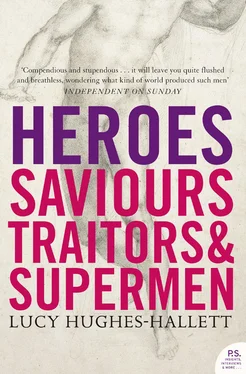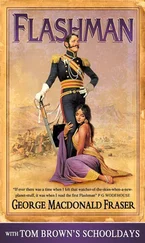The Athenian alliance was defeated in 418 BC at the battle of Mantinea, but its failure cannot be blamed on Alcibiades, whose term as general had elapsed. During the following years he loomed ever larger in the small world of Athens, menacing those who mistrusted him, dazzling his many admirers. Everything about him was excessive – his wildness, his glamour, his ambition, his self-regard, the love he inspired. In a society whose watchword was ‘Moderation in all things’ he was a fascinatingly transgressive figure, an embodiment of riskiness, of exuberance, of latent power. ‘ The fact was’, writes Plutarch, ‘that his voluntary donations, the public shows he supported, his unrivalled munificence to the state, the fame of his ancestry, the power of his oratory and his physical strength and beauty, together with his experience and prowess in war, all combined to make the Athenians forgive him everything else.’
The dinner party described in Plato’s Symposium , which contains the fullest contemporary description of Alcibiades, dates from this period. The host is the poet Agathon, who is celebrating having won the tragedian’s prize. As the wine goes round the guests take turns to talk about love. They are serious, competitive, rapt. At last it is Socrates’ turn. In what has proved one of the most influential speeches ever written he enunciates his deadly vision of a love divested in turn of physicality, of human affection, of any reference whatsoever to our material existence. He finishes. There is some applause and then – right on cue – comes a loud knocking at the door. There is an uproar in the courtyard, the sounds of a flute and of a well-known voice shouting, and suddenly there in the doorway is the living refutation of Socrates’ austere transcendentalism. The philosopher has been preaching against the excitements of the flesh and the elation attendant on temporal power. To mock him comes Alcibiades, wild with drink, his wreath of ivy and violets slanted over his eyes, flirtatious, arrogant, alarming, a figure of physical splendour and worldly pride forcing himself into that solemn company like a second Dionysus. No wonder, as Nepos wrote, Alcibiades filled his fellow Athenians ‘ with the highest hopes, but also with profound apprehension’.
In 416 BC, when he was thirty-four, he entered no fewer than seven chariots in the games at Olympia, something no one, commoner or king, had ever done before him, and carried off three prizes. Euripides wrote a celebratory ode: ‘ Victory shineslike a star, but yours eclipses all victories’. The games were far more than a sporting event: they were festivals of great religious and political significance attended by crowds from all over the Greek world. Alcibiades celebrated his triumph with superb ostentation, drawing on the resources of his far-flung clients and dependants, pointedly making a display of a network of personal influence spreading all the way across the eastern Mediterranean. ‘ The people ofEphesus erected a magnificently decorated tent for him. Chios supplied fodder for his horses and large numbers of animals for sacrifice, while Lesbos presented him with wine and other provisions which allowed him to entertain lavishly.’ Alcibiades was only a private citizen, but with his wealth and his pan-Hellenic connections he formed, on his own, a political entity that looked like rivalling Athens itself.
It was too much. On the plain before Troy, Achilles measured his status as an outstandingly gifted individual against Agamemnon’s regal authority. At Olympia, Alcibiades, in parading his wealth, his influence and his talent, seemed to be issuing a parallel challenge to the state of which he was part but which he threatened to eclipse. So, at least, his contemporaries understood the spectacle. He was accused of having the city’s gold and silver ceremonial vessels carried in his triumphal procession and of having used them at his own table ‘ as if they werehis own’. Non-Athenians, maintained one of his critics, ‘laughed at us when they saw one man showing himself superior to the entire community’. Answering the grumblers, Alcibiades asserted that in making himself splendid he was doing a service to his country, that a city needs its illustrious men to personify its power. ‘ There was a timewhen the Hellenes imagined that our city had been ruined by the war, but they came to consider it even greater than it really is because of the splendid show I made as its representative at the Olympic games … Indeed this is a very useful kind of folly, when a man spends his own money not only to benefit himself but his city as well.’ Not everyone was convinced. After Alcibiades won another victory at the Nemean games, the great painter Aristophon exhibited a portrait of him. Any visual representation of him, it should be remembered, would have paid tribute to his striking beauty, and beauty, in fifth-century Athens, was commonly understood to make a man eligible for far more than mere sexual conquest. ‘ This much is clear,’ wrote Aristotle in the next generation. ‘Suppose that there were men whose bodily physique showed the same superiority as is shown by the statues of the gods, then all would agree that the rest of mankind would deserve to be their slaves.’ The people crowded to see Aristophon’s painting, but there were those who ‘ thought it a sightfit only for a tyrant’s court and an insult to the laws of Athens’. There was no place within a democracy for an Alcibiades. ‘ Men of sense’, warned a contemporary orator in an address entitled ‘Against Alcibiades’, ‘should beware of those of their fellows who grow too great, remembering it is such as they that set up tyrannies.’
In the winter of 416–415 BC Alcibiades was at last presented with an adventure commensurate with his ambition. A delegation arrived in Athens from Sicily, asking the Athenians to intervene in a war between their own colonists there and the people of Syracuse, a colony and powerful ally of the Spartans. The careful Nicias put forward sound arguments against undertaking such a risky and unnecessary venture, but Alcibiades was all for action. According to Plutarch, he ‘ dazzled the imaginationof the people and corrupted their judgement with the glittering prospects he held out’. All Athens caught his war fever. The young men in the wrestling schools and the old men in the meeting places sat sketching maps of Sicily in the sand, intoxicating themselves with visions of conquest and of glory. The projected invasion of Sicily was not expedient, it was not prudent, it was not required by any treaty or acknowledged code of obligation; but its prospect offered excitement, booty, and the intangible rewards of honour. In the Assembly, Alcibiades, the man of whom it was said that without some great enterprise to engage his energies he became decadent, self-destructive, and a danger to others, ascribed to the state a character to match his own: ‘ My view isthat a city which is active by nature will soon ruin itself if it changes its nature and becomes idle.’ He argued that, like himself, Athens was the object of envy and resentment, impelled for its own safety to make itself ever greater and greater. ‘It is not possible for us to calculate, like housekeepers, exactly how much empire we want to have.’ At Olympia, he claimed, Alcibiades was identified with Athens. Now, in urging the war in Sicily, he was offering Athens the chance to identify with Alcibiades, to be, like him, bold and reckless and superbly overweening.
He won fervent support. Nicias, in a last attempt to halt the folly, pointed out that the subduing of all the hostile cities in Sicily would require a vast armada, far larger and more expensive than the modest expeditionary force initially proposed. But the Assembly had by this time cast parsimony as well as prudence to the winds. They voted to raise and equip an army and navy commensurate with their tremendous purpose. The generals appointed to command the expedition were one Lamachus, the appalled and reluctant Nicias, and Alcibiades.
Читать дальше












